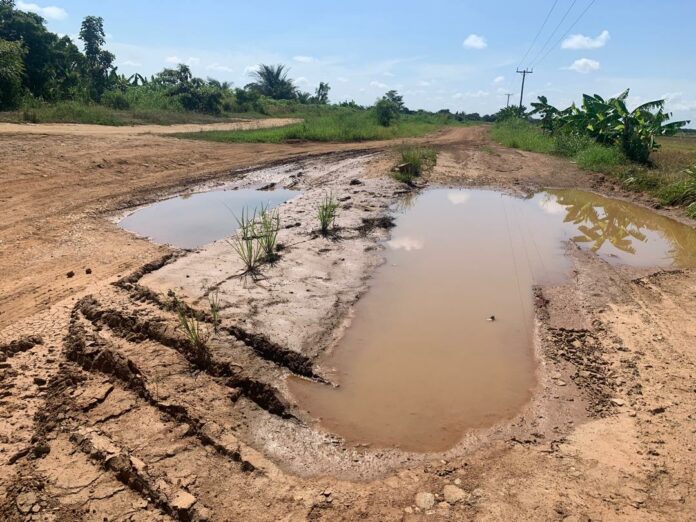In the serene town of Akuse, nestled within the Lower Manya Krobo Municipality of Ghana’s Eastern Region, discontent is brewing among its residents.
The focal point of their frustration is the dire state of the only major road connecting their township to the Greater Accra Region, a lifeline that links Battor-Aveyime and Sogakope-Aflao.
Akuse, renowned for its historical significance as one of Ghana’s ancient trade centers and home to the country’s second hydroelectric dam managed by the Volta River Authority (VRA), finds itself grappling with a critical infrastructure issue.
While an asphalt road maintained by the VRA provides decent access to its offices and staff residences, the remainder of the roads in the area are reportedly in appalling condition.

The local populace, predominantly engaged in farming, voices vehement dissatisfaction over the lack of essential social amenities, with the roads emerging as a paramount concern.

Residents argue that the poor road conditions not only hamper daily commutes but also detrimentally impact economic activities crucial for sustaining livelihoods in the community.

Expressing her dismay, Norvi, a female motor rider, emphasized the personal toll of the road’s deterioration. She disclosed her decision to withhold the voting rights of her three workers and two newly eligible voting-age children, citing the perceived neglect of Akuse’s needs by political authorities.

The discontent has prompted local leaders like James Mensah, an assemblyman from Osuwen, to launch a bold “No Road, No Vote” campaign ahead of the 2024 elections.

Mensah and other community leaders, including Ibrahim Mahama, a zonal council chairman, underscore the community’s frustration with the government’s alleged failure to address the road issue despite the heavy daily traffic of long vehicles and trucks from the area’s ten prominent companies.

In a collective plea to the government, opinion leaders such as Nene Abraham Teye and Enoch Akagbo urge swift action to rehabilitate Akuse’s roads before the upcoming general election.

They argue that improving road infrastructure is critical not only for enhancing transportation but also for ensuring better access to vital services such as markets, schools, and healthcare facilities.

The outcry from Akuse reflects broader concerns about infrastructure development in rural Ghana and underscores the urgent need for political leaders to prioritize the community’s welfare in their governance agendas.
By Joseph Armstrong Gold-Alorgbey










![[PHOTOS] Kumasi: Suame Magazine artisans protest deplorable roads, bemoan MP’s lip service](https://onuaonline.com/wp-content/uploads/2022/07/IMG-20220715-WA0015-218x150.jpg)


